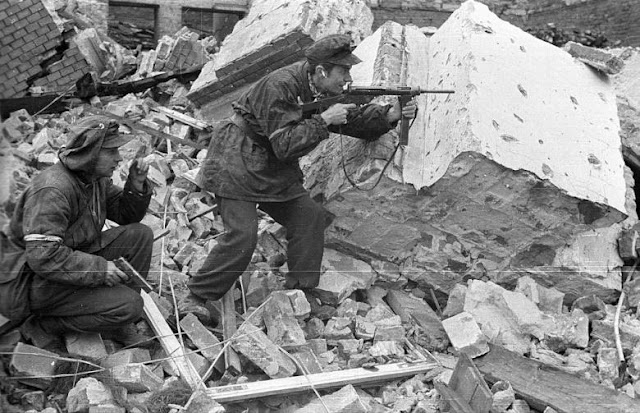August is the anniversary of the uprising of Warsaw in 1944, not to be confused with the uprising of the Warsaw ghetto a year earlier. It was the largest military operation carried out by a partisan movement during World War II. The fighting lasted until the 2nd of October, when the German military managed to recapture the city.
Controversially, during the fighting the Soviet army had already penetrated Polish territory and its forward units had managed to push to city limits. But the army offered no assistance and simply held its position and just let the fighting take its course. Well with the exception of Polish soldiers fighting under the Soviet army, they did take part but they had no support from air or land. In the end the only support the Polish partisans fighting as part of the Polish Underground State got was from the British and American air forces which carried out several supply drops.
Despite surrendering, the Polish Underground remained active though in reduced circumstances and found itself in increased conflict with the Soviet occupation, which had been stepping up the pressure on the independent Polish resistance. On the 1st of July 1945 it published a document that contained this programme for a independent Poland.
A friend of mine (https://twitter.com/EnbySasha1312) translated it and provide links and notes.
Parentheses are historical notes, square brackets are
translation notes
The Testament of Fighting Poland
by the Council of National Unity (https://en.wikipedia.org/wiki/Council_of_National_Unity, https://en.wikipedia.org/wiki/Polish_government-in-exile)
Consists of the following postulates:
1. Soviet armies and political police are to leave the territory of Poland.
2. Cessation of political persecution, which will be proved by:
a) release of those tried and jailed during the Moscow Trial (https://en.wikipedia.org/wiki/Trial_of_the_Sixteen,
b) amnesty to political prisoners and all Home Army soldiers and so-called "forest units"(https://en.wikipedia.org/wiki/Polish_resistance_movement_in_World_War_II),
c) return of Poles deported into Russia and cessation of the use of concentration camps, so reminiscent of the sombre memory of German totalism,
d) cessation of the political system, encapsulated in the existence of the so-called Ministry of Safety (reference to https://en.wikipedia.org/wiki/Chekism),
3. Unification and self-determination of the Home Army (https://en.wikipedia.org/wiki/Home_Army) via:
a) granting officer positions to Poles [originally “spolszczenie korpusu oficerskiego” – “polonisation of the officer corps”] in general Rola-Żyrmiński's (https://en.wikipedia.org/wiki/Micha%C5%82_Rola-%C5%BBymierski) army,
b) honourable return with their guns of Polish forces in exile (https://en.wikipedia.org/wiki/Polish_Armed_Forces_in_the_West),
c) unifying on equal terms Polish armies abroad and former Home Army with general Rola-Żyrmiński's army,
4. Cessation of economic devastation of the country by the occupying Powers.
5. Allowing all democratic parties to take part in universal, direct, equal, proportional and anonymous [originally “pięcioprzymiotnikowe” – five-adjective, a term in Polish political science] elections.
6. Assurance of independent foreign policy of Poland.
7. Creation of a full local government, as well as socio-economic and cultural-educational government.
8. Socialisation of great capitalist [originally “wielkokapitalistyczne” – refers both to big corporation and individual haute-bourgeoisie] property and socially equal division of common profit.
9. Guaranteeing to the labouring masses control and common ownership over the entire national economy and ensuring material conditions [this, most likely, refers solely to wages and such] safeguarding the existence of families and personal cultural development.
10. The freedom for the working class to fight for their rights as part of an unrestricted labour movement.
11. Just commencement of the agricultural reform and the control of the nation over the settlement processes in the reclaimed Western Lands and Eastern Prussia (https://en.wikipedia.org/wiki/Recovered_Territories).
12. Basing a common, democratic education system on the moral and spiritual achievements of the western civilisation and of our country.
Ensuring the fight for this programme on the open international stage, the democratic associations of the Council of Polish Unity express their hope that the Temporary Government of National Unity (https://en.wikipedia.org/wiki/Provisional_Government_of_National_Unity) will strive to democratise Poland and put an end to differences and quarrels separating the different strands of the Polish society.
As long as this striving does not manifest itself in action, we will not be able to relax in the interior affairs and a lot of the members of the Polish Underground State will be forced to remain in hiding, not from malicious intent towards the Government, but because of the fear for their life.
From their side, the Polish Underground State proclaims it does not want to provoke a war between the Democratic West and the Soviet Union, which - as the (Soviet) government newspapers would have it – “is what the London government (reference to the Polish government-in-exile) bases their political calculations on”
A new war would deeply wound the Polish nation, therefore everyone it is everyone’s desire to seek a Polish-Russian agreement, as well as an agreement between England, America and the Soviets on peaceful terms. If this agreement is to be sustainable, restoring trust in the Polish-Russian relationship won’t be enough. The Polish nation is a member of big family of Central European nations, especially West-Slavic ones, to which it is bound to, because of its geopolitical situation and historical past, and wants to create as close of a political, economic and cultural union with them as possible.
We express our hope that achieving an agreement with Russia on these terms is possible and only this agreement will eliminate for all time the Polish-Russian enmity, that stems from the reactionary politics of the Tsardom and which will be replaced by mutual respect, trust and friendship for the benefit of both nations, Europe and all democratic humanity.
The Council of National Unity
Despite being published in July Sasha believes it had been written up earlier, mainly because the Council of National Unity had already dissolved.




.jpeg)









No comments:
Post a Comment